20 Aug 2014 | Azerbaijan, Azerbaijan Letters, Europe and Central Asia, News and features
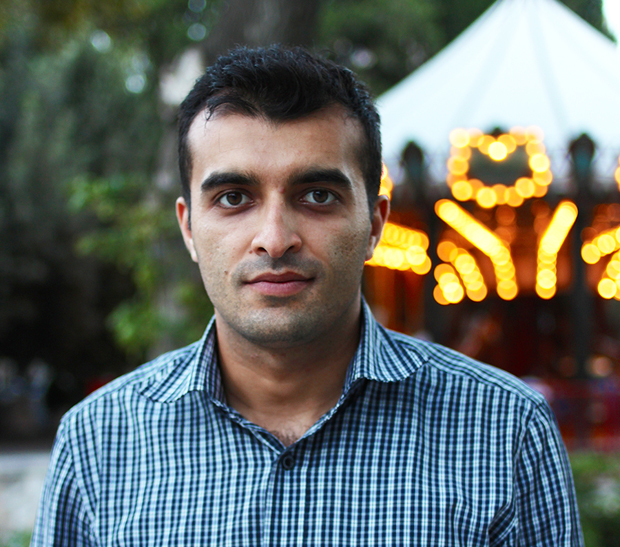
Rasul Jafarov in September 2013 (Photo: Melody Patry)
In early August, Azerbaijani human rights activist Rasul Jafarov was charged with tax evasion, illegal entrepreneurship and power abuse and sentenced to three months of pre-trial detention, as part of a crackdown on the country’s human rights groups and dissident voices. This is his appeal to the international community.
Ladies and gentlemen, dear friends,
I would like to bring to your attention that the charges brought against me are completely unlawful and groundless. One might ask why? Because,
- I was registered as an individual entrepreneur with the tax authorities on 25 August 2008 and obtained a taxpayer identification number (TIN). From that time up until now, I fully and timely paid relevant taxes and social insurance contributions in accordance with the funds paid to me for my services under the projects in which I was involved. It can be easily verified by sending an inquiry to tax agencies.
- The Human Rights Club was founded in December 2010, and at the founding meeting I was elected the chairman of the organisation. The Human Rights Club has repeatedly applied to the ministry of justice for registration, but due to unjustified and unlawful denial of state registration, appeals were made to all relevant courts in Azerbaijan, and at present this case is pending before the European Court [of Human Rights]. The process of seeking registration and filing appeals continued from 2011 till 2013; since the legislation during this period did not prohibit the activity of unregistered NGOs, we, as the Human Rights Club, implemented a variety of projects during the years 2011-2013. Each of these projects was carried out under the grant agreements signed with donor organisations which I have voluntarily presented to the prosecutor general’s office. Also, at the time of signing of these agreements, the ministry of justice was informed through relevant letters sent to this state body. Moreover, the funds under each grant were transferred not in a secret or non-transparent manner, but through transfers to the bank accounts open and accessible for law enforcement and other relevant agencies, with the purpose of each transfer being indicated as “grant”. Since the Human Rights Club (HRC) was not registered, as the chairman of the HRC the transfers were made to my bank accounts. In this case, what kind of illegal entrepreneurship or abuse of office or tax evasion one can talk about?
You may wonder then why I was arrested. Let’s pay attention to the projects examined by the investigators and covered by the indictment:
- Human rights campaign related to Eurovision — Sing for Democracy; Art for Democracy campaign that uses different types of art to promote and protect human rights; increasing voter turnout on the eve of elections and so on. Along with being in the spotlight of the local and international community, all of these projects were targeted in libellous and insulting articles of the pro-government media which also included the ruling party’s official newspaper Yeni Azerbaijan.
- Azerbaijani government argues everywhere and at the highest level that there are no political prisoners in Azerbaijan. However I and my colleagues do not argue, but prove that there are political prisoners in Azerbaijan.
- During the session of the parliamentary assembly of the Council of Europe held in June 2014, i.e. shortly before my arrest, a roundtable was held on the gravity of the human rights situation in Azerbaijan. I was the person who was directly involved in determination of everything from the technical aspects to the content of the roundtable (together with Intigam Aliyev, Emin Huseynov and Rashid Hajili who are currently persecuted). I was also involved in organising the flash-mob held by our young friends on the day of Ilham Aliyev’s speech. And finally, in the past 2-3 years everyone was asking half-joking, half-serious, when I was going to be arrested. It happened, and now I’m looking forward to your support! Thank you everyone
Sincerely,
Rasul Jafarov
Baku Pre-Trial Detention Center (Kurdakhani settlement)
14 August 2014
8 Aug 2014 | Azerbaijan, Azerbaijan News, Europe and Central Asia, News and features
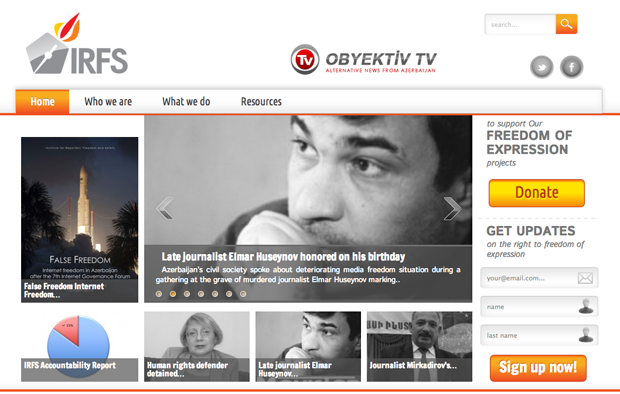
(Image: IRFS)
The offices of Azerbaijani press freedom organisation Institute for Reporters’ Freedom and Safety (IRFS) were on Friday searched by police – the latest in a new clampdown by authorities on human rights groups in Azerbaijan. Human rights lawyer Intigam Aliyev also had his home searched, and has been sentenced to three months pretrial detention.
The IRSF offices were today surrounded by police officers according to reports from Azerbaijan. There are unconfirmed reports that Emin Huseynov, the head of the organisation, has been detained. He was already under a travel ban.
Over the past two weeks, human right defenders Leyla and Arif Yunus and Rasul Jafarov have been sentenced to three months of pretrial detention, facing charges including high treason, state betrayal and tax evasion. One of the country’s few remaining independent newspapers, Index Award winner Azadliq, has been forced to suspend publication due to financial troubles.
IRFS has been reporting on these and other instances of apparent state targeting of opposition voices. The NGO was founded in 2006, “in response to growing government restrictions on freedom of expression and freedom of press,” according to their mission statement. The latest global press freedom index from Reporters Without Borders ranks Azerbaijan at 160 out of 180 countries, and the recent estimates puts the number of political prisoners in the country at over 140.
The recent cases have taken place against a backdrop of heightening tensions between Azerbaijan and neighbouring Armenia, which so far has left at least 14 people dead. President Aliyev on Thursday published a series of tweets on his personal Twitter account which seemed to threaten war with Armenia. The troubled relationship between the two countries has also played a part in cases against dissidents, including Leyla Yunus who has been accused of spying for Armenia.
In May, Azerbaijan assumed chairmanship of the Council of Europe’s (COE) Committee of Ministers, whose tasks include “ensure[ing] that member states comply with the judgments and certain decisions of the European Court of Human Rights”.
In a statement on Friday, the COE said Secretary General Thorbjørn Jagland has “revealed his deep concern at the arrest of Azerbaijan human rights defender Leyla Yunus and the prosecution case against her husband Arif”.
“By stifling dissent, Azerbaijan is failing to comply with its international obligations which require safeguarding freedom of expression, assembly and association. It is necessary that Azerbaijan reverse the situation,” COE Commissioner for Human Rights Nils Muiznieks has told Azerbaijani media.
Index on Censorship, along with 60 other NGOs, has called for the immediate and unconditional release of Leyla and Arif Yunus and Rasul Jafarov. Today Index reiterates this call and raised its concerns with Britain’s Foreign and Commonwealth Office.
“It is deeply worrying that while international attention is directed at conflicts elsewhere, Azerbaijan appears to be resuming oppression of dissent,” said Jodie Ginsberg, CEO of Index on Censorship. “This is a country showing blatant disregard for human rights while presiding over an institution that describes itself as the continent’s ‘leading human rights organisation.’ The fellow members of the Council of Europe must do more to show Azerbaijan its actions must cease immediately.”
This article was published on August 7, 2014 at indexoncensorship.org
9 Oct 2013 | Azerbaijan, Azerbaijan News, News and features, Volume 42.03 Autumn 2013
In the run up to today’s Azerbaijani presidential election, we publish an article and photographs from Index on Censorship magazine showing how the authorities have cracked down on journalists, activists and artists that criticize the government. These stories of the risks journalist and photographers face show how far the regime will go to silence its critics including intimidation and prison sentences. Writers Rasul Jafarov and Rebecca Vincent document the stories of some of the country’s courageous photojournalists, who have documented what life is really like under President Ilham Aliyev.
“In authoritarian regimes, art can serve as a powerful means of expressing criticism and dissent, subverting traditional means of censorship. Photography is particularly telling, capturing the raw truth and making it difficult for even seasoned propagandists to refute. These photographs, from Abbas Atilay, Shahla Sultanova, Mehman Huseynov, Aziz Karimov, Ahmed Muxtar and Jahangir Yusif, show a side of the capital Baku that contrasts sharply with the sleek, glossy image President Ilham Aliyev’s government seeks to portray. They expose an authoritarian regime prepared to arrest those who document protests and criticism — journalists, human rights defenders, civic and political activists and even ordinary citizens.
But those who embrace subjects others prefer to avoid, exposing unsavoury truths the Azerbaijani authorities would prefer to keep hidden — such as corruption and human rights abuses — do so at significant personal risk and hardship.
As journalists, they face intimidation, harassment, threats, blackmail, attacks and imprisonment in connection with their work, which is seen as direct criticism of the authorities. As artists, they face economic hardship and restrictions on where they can display and disseminate their work.
Most of these images were taken during unsanctioned protests in Baku. Photographers face particular hazards when covering protests in Azerbaijan, as not only can they be injured in the general chaos, but they can also be singled out because of their work. The Institute for Reporters’ Freedom and Safety reports that so far in 2013 there have been 17 attacks against journalists and photographers covering protests.
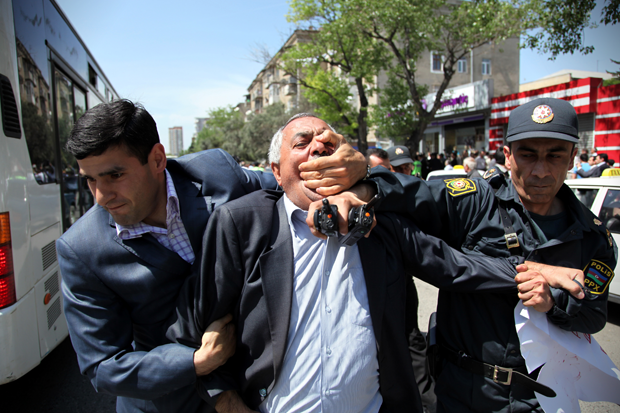
Narimanov Park, Baku, 15 May 2010. Police forcibly detain a political activist during an unsanctioned protest. Photograph by Abbas Atilay
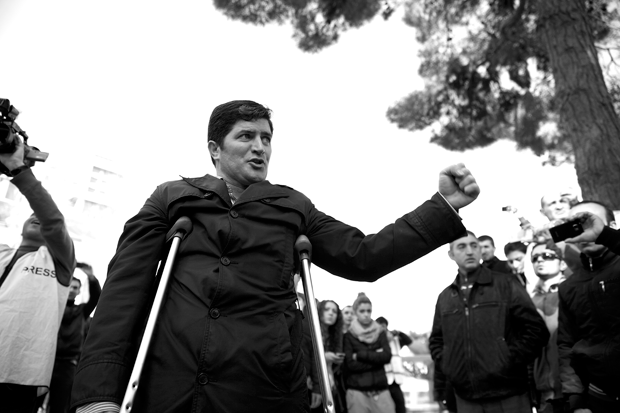
Fountain Square, Baku, 10 March 2013. A political activist during an unsanctioned demonstration protesting the deaths of military conscripts in non-combat situations. Authorities used excessive force to disperse the peaceful protest and detained more than 100 people. Photograph by Jahangir Yusif
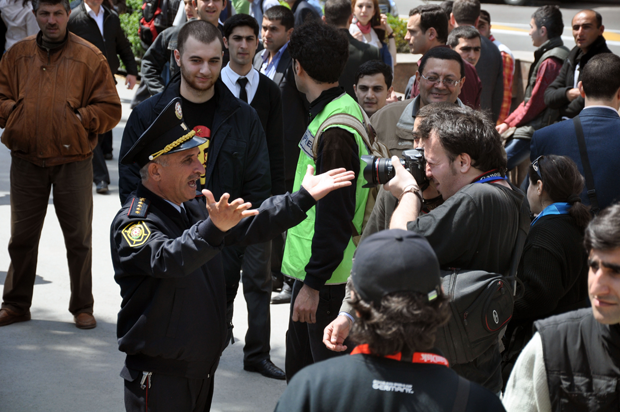
Sabir Park, Baku, 11 March 2011. During an unsanctioned political protest
in the wake of the Arab Spring, a police officer encourages journalists to take his photo. This was a rare move, which the photographer believes was intended to distract photographers from other aspects of the protest, such as police physically restraining protesters. Photograph by Mehman Huseynov
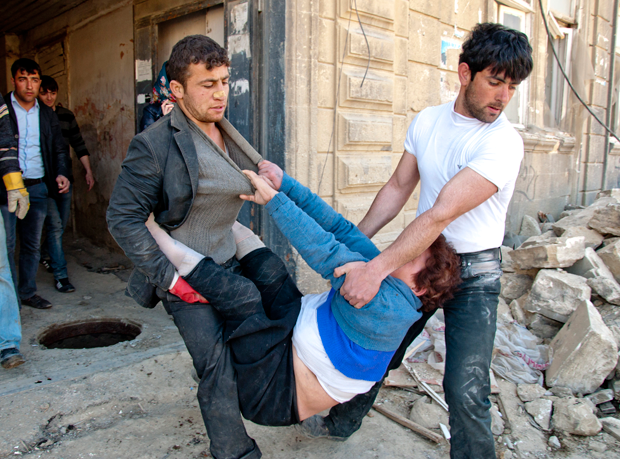
Shamsi Badalbayli Street, Baku, 2 April 2012. A resident is forcibly evicted from the area where the Winter Garden will be constructed. Approximately 300 complaints have been sent to the European Court of Human Rights related to forced evictions from this area. Photograph by Ahmed Muxtar
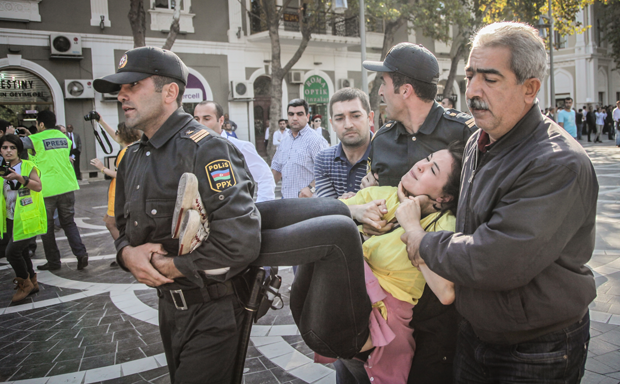
Fountain Square, Baku, 20 October 2012. Police detain a young opposition activist during an unsanctioned protest calling for parliament to be dissolved after a video was released showing an MP discussing the sale of parliamentary seats. Dozens of activists were detained during that protest. Photograph by Aziz Karimov
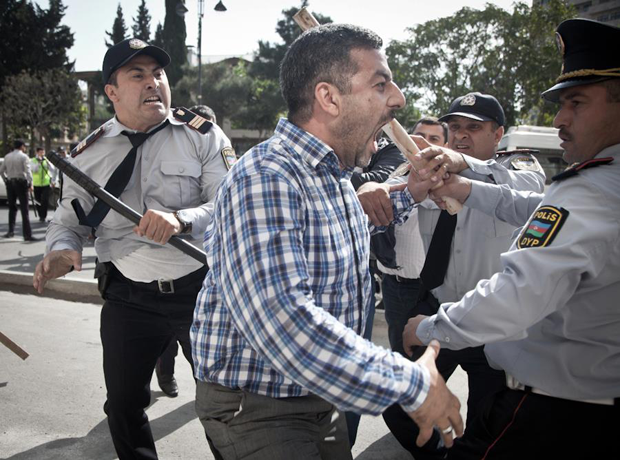
Hijab ban, 5 October 2013. Photograph by Aziz Karimov
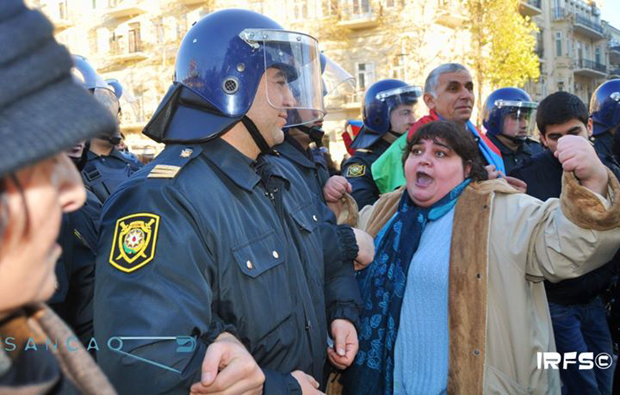
Investigative journalist Khadija Ismayilova confronts police. Photograph by Mehman Huseynov
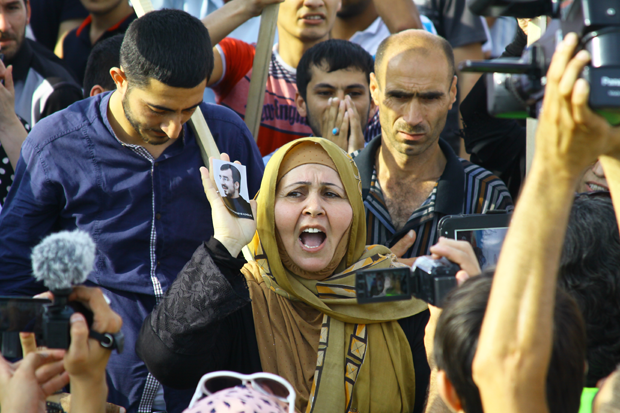
Nevreste Ibrahomova, head of Azerbaijan Islamic Party’s Women Council, holds the photo of an arrested Azerbaijani Islamist and chants freedom to him. Photograph by Shahla Sultanova
Photographers also face arrest and protracted legal action as a result of their work. Mehman Huseynov faces up to five years in prison on politically motivated hooliganism charges stemming from an altercation with a police officer during protests ahead of the Eurovision Song Contest in May 2012. The photographers featured in this story are among the few courageous individuals in Azerbaijan who remain willing to take on the risks associated with this work. They need international support and protection before they, too, become the subjects rather than the artists.”
Rasul Jafarov is the chairman of the Human Rights Club and project coordinator of the Art for Democracy Campaign. Rebecca Vincent is Art for Democracy’s advocacy director. She writes regularly on human rights issues in Azerbaijan
To find out more about the magazine and for subscription options, and read more about stories from the issue click here. These photographers will be part of an exhibition in London this winter. For more details, follow @art4democracy Join us to launch of Index on Censorship’s autumn issue on 15 October. To register for the event, click here.
12 Apr 2012 | Europe and Central Asia
This is a crosspost from the Media Legal Defence Initiative
On the eve of the Eurovision song contest, Azeri journalists have complained to the European Court of Human Rights about the president’s stranglehold over the country’s broadcasting system.
Every year millions of people around the world watch the Eurovision Song Context, one of the biggest annual international media events. But many may not know that this year it is being hosted by a country which tightly controls its own media and offers its own viewers little choice in what they can watch – Azerbaijan.
In this former Soviet republic most TV and radio outlets are controlled by President Aliyev or members of his family, while nominally independent broadcasters are owned by people close to him. Moreover, the president appoints all nine members of the broadcasting regulatory body, the National Television and Radio Council, whose responsibilities include granting broadcast licences.
One consequence is that, though freedom of speech is officially guaranteed by the constitution, there is little public debate on political, economic and other vital issues. Violence against journalists and bloggers in the country is endemic and independent journalists work in a climate of constant legal threat.
But now two prominent Azerbaijani journalists have gone to the European Court of Human Rights to challenge this effective monopoly of control. The journalists — Yashar Agazade and Rasul Jafarov — have lodged a complaint about the repeated refusal of the regulatory council to grant a licence for the independent radio station they wish to set up.
They argue that this refusal not only denies their right to freedom of expression under Article 10 of the European Convention on Human Rights but means Azerbaijan is failing to ensure a pluralistic media landscape as the Convention requires it to.
Their application comes on the back of some fifty other complaints from Azeri journalists already pending at the Strasbourg court.
The matter has particular urgency because elections are due in 2013, and a favourable decision would force the government to make media reforms that would allow for more open debate before then. So whatever the outcome of the coming Eurovision contest, the journalists are hoping their case — which is being supported by MLDI — will result in a “nul point” verdict from the European Court judges.
Mark Stephens of Finers Stephens Innocent, part of the legal team for the applicants, said:
“Azerbaijan has de facto outlawed criticism of its leadership. If an Azeri journalist engages in the sort of tongue-in-cheek commentary that is provided for Eurovision by Graham Norton, chances are it will result in their imprisonment. So it is essential for this case to be successful if tongue-in-cheek comments are to be made either by Graham Norton, or indeed Azeri journalists on local political matters — or, indeed, Eurovision.”
www.mediadefence.org










